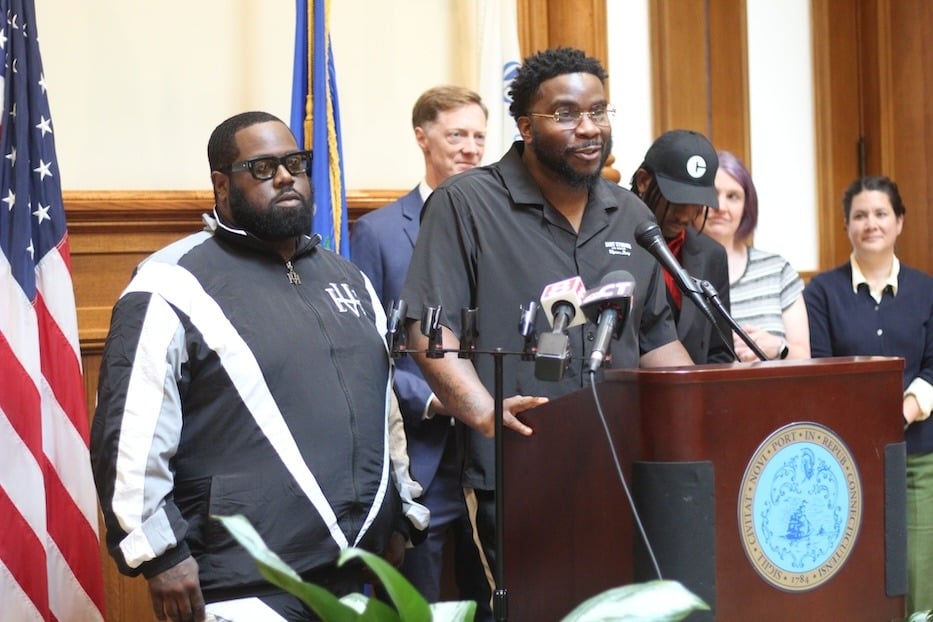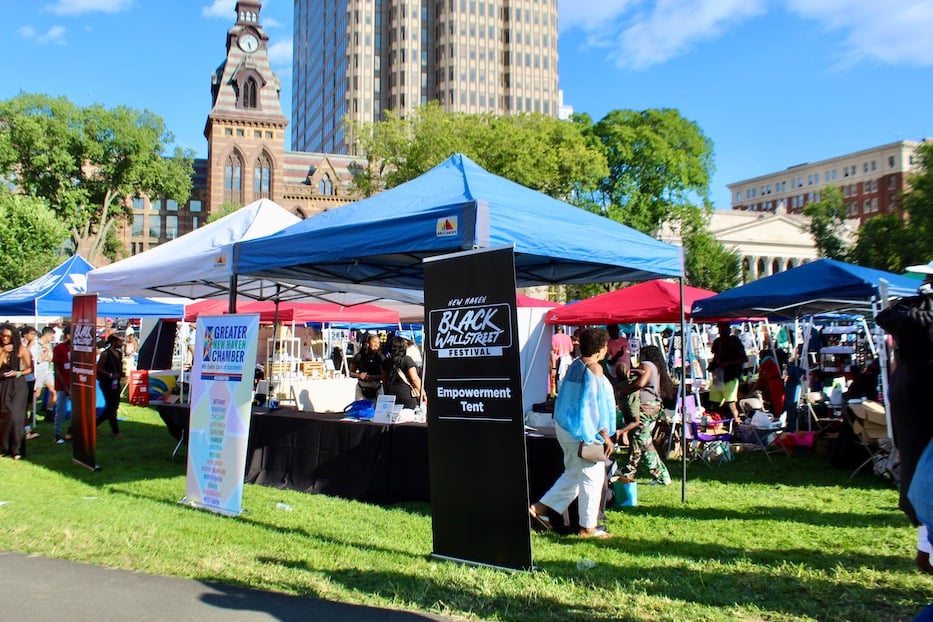
Black-owned businesses | Culture & Community | Downtown | Economic Development | Arts & Culture | New Haven Green | Arts & Anti-racism


Top: Diane X. Brown and Erik Clemons. Bottom: Last year's festival on the New Haven Green. Lucy Gellman Photos.
When Diane Brown was growing up in Newhallville, she stood on the shoulders of New Haven revolutionaries until she became one herself. Now, she sees a younger generation picking up that work—and for the first time in a while, she feels hopeful about the city that raised her.
Brown brought that message to City Hall Wednesday afternoon, as city officials, Black business owners, nonprofit leaders, and half a dozen collaborators outlined New Haven’s third annual Black Wall Street Festival (BWS Fest) a week-long celebration of Black entrepreneurship, arts and culture ,and community that begins next week.
For the first time this year, it will include a film festival, as well as a fashion show, entrepreneur party and closing brunch. A full calendar of the festivities, which run August 12 through 18, is available here. The BWS Fest itself takes place August 17 on the New Haven Green, where it moved last year after outgrowing its initial space. This year, it will feature over 200 vendors.
“The ancestors are proud,” said Brown, who runs An Urban Librarian Consulting and is the branch manager at Stetson Library on Dixwell Avenue, after giving Mayor Justin Elicker a hug and handshake. “In my role, I struggle. I fight every day for people that look like me to just be treated fairly. I don’t see much around me that gives me hope …[but] this gives me hope. This gives me hope. This young generation of people here, it gives me hope.”

Rashad "Snacks" Johnson and Aaron Rogers.
It marks a year of record growth for the festival, which began in Temple Street Plaza in August 2022. A collaboration between the city’s Department of Arts, Culture and Tourism and The Breed Entertainment, it came just months after the city had announced its inaugural cultural equity plan, a municipal roadmap to more inclusive resource allocation in the arts.
At the time, The Breed Co-Founders Aaron Rogers and Rashad “Snacks” Johnson brought in over 35 vendors, from artists and makers to musicians, fashion designers, and small businesses owners. Then last year, they returned with more partners, from Brown’s consulting business to the then-nascent New Haven Equitable Entrepreneurial Ecosystem (NHE3) and the Community Foundation for Greater New Haven.
This year, the festival has continued to grow, with 200 vendors, food trucks, an hours-long line up of musicians, and a zone specifically for families. Economic Development Administrator Mike Piscitelli noted that some of that growth was inspired directly by a series of “Civic Space” conversations that city officials hosted in summer 2021, as pandemic relief dollars began to arrive in New Haven. One of the biggest requests he heard, he remembered, was “wealth creation in Black and Brown communities.”
“That is great on paper, and then identifying partners who can carry it out and lifting it forward, that can only be done by people like you,” he said to Cultural Affairs Director Adriane Jefferson. “And I cannot thank you enough for carrying that ball forward, and proving the concept that is behind how government can create some assistance.”

Anthony Brown of A Nice Touch Auto Detailing and Candice Williams of Herbal Jones LLC, a holistic wellness brand. "Thank you for having us. It's amazing," Williams said.
This year, that momentum begins on Monday, August 12, with an hours-long artist showcase at the Cambria Hotel on Dwight Street in New Haven. Part concert and part gallery, the event was designed with musicians in mind, said Johnson—but is open to artists across media, with prizes for those who bring their A game and arrive with work that they are ready to share.
On Tuesday, the festival will partner with the not-for-profit Black Haven to host a one-night Black film festival and performance of Death By A Thousand Cuts outside the Dixwell Community Q House, where a plaza stretches across 197 Dixwell Ave. The next days bring New Haven a “Power in Our Dollar” investing summit at City Hall, fashion show at CITA Park curated by District Arts & Entertainment’s Erika Stine and New Haven-based designer Strizz, an entrepreneur party at the Canal Dock Boathouse, a day-long festival, and a closing brunch.
“The week is just gonna be amazing,” said Johnson. The week will also include a rollout of an official app, BWS Network, dedicated to finding and supporting Black business in and beyond New Haven. In addition to a resource hub with festival press, a calendar and a message center, it includes a financial toolkit and space to digitally register businesses.

Several of Wednesday’s speakers highlighted not only their excitement, but the festival’s historical significance. The name “Black Wall Street” comes from the history of Greenwood, a self-sustaining, prosperous Black business district and neighborhood in Tulsa, Oklahoma that was burned to the ground in a horrific, racially motivated massacre in 1921. The massacre leveled Tulsa’s “Black Wall Street” and killed hundreds of people, the majority of whom were Black.
But it was not the only “Black Wall Street” to exist—or be forgotten, Cultural Affairs Director Adriane Jefferson has previously noted. Self-sustaining Black business districts, neighborhoods and whole towns existed across the country, from Oscarville, Georgia to the Hayti neighborhood in Durham, North Carolina to Farish Street, once called the “Black Mecca” of Jackson, Miss. Almost all of them met the same fate, violently destroyed in the wake of white supremacy, racist and fabricated allegations, and anti-Black violence.
“When we talk about Black Wall Street festivals, when we say ‘Black Wall Street Festival,’ we are really honoring our ancestors,” said Jefferson, who has become a fierce and steadfast advocate of Black and Brown artists during her time in New Haven. “We are really honoring a legacy of people that came before us, who have paved a way, who understood the great power in the economic Black dollar. That when you have economic wealth, you have freedom.”
“And so you are liberating a generation of people to be able to create generational wealth,” she continued. “All we’re trying to do is create a little of that here … truthfully, the work is not done.”

Erik Clemons, founding CEO of the Connecticut Community Outreach and Revitalization Program (ConnCORP) and CEO and President of Connecticut Center for Arts & Technology (ConnCAT), praised Jefferson, Rogers, and Johnson for their vision.
In his day to day work at ConnCORP and ConnCAT, Clemons is a champion of Black business growth, employment, art and artists, and spaces for Black people to safely and joyfully gather. In the festival’s celebration of Black entrepreneurs and creatives, the BWS team has transformed a deeply traumatic history—the 1921 Tulsa Race Massacre—into a movement that goes well beyond this year.
“You all have turned a massacre into a festival,” he said. “That deserves a round of applause. Adriane, especially Adriane, and this team, who have chosen to turn the hate from the past into hope for the future, I thank you for that.”
“My prayer and hope is that this Black Wall Street endeavor becomes institutionalized in New Haven, and that all folks who truly care about equity and humanity, that they wrap their arms around Adriane and Aaron especially,” he added. “I so look forward to being in community with you all next week.”

Dawn Leaks Ragsdale, who in March of this year was named the president of the Center for Inclusive Growth. This summer, the center has stepped onboard as a supporter of the festival. "I think there's a sentiment that Black people and people of color are looking for some sort of handout or some sort of special treatment. Really, they're just looking for equity," she said. "Historically, we have always been innovators, builders, creators."
Brown, who has championed Jefferson’s work since she started at the city, added that she sees the BWS team as a group of revolutionaries, much like the Black Panthers and neighborhood advocates she looked up to during her childhood in New Haven. Almost seven decades later, they give her a sense of hope that she’s been hard pressed to feel lately.
She later said that when she works with the BWS Fest team, she can also feel the Black matriarchs, business owners, and activists who raised her, from her late mother to the Huckaby family, who ran the Black clothing and beauty store Unique Boutique at 278 Dixwell Ave. for decades.
“Last year, I could count people that did not look like me on one hand,” she said. “I was so proud. The ancestors are proud, as your elder, I am proud. I have never seen anything of that magnitude in New Haven, Connecticut, in my 67 years of being in this city. I have never seen anything being done that courageous, that bold … you just stepped out there on faith, and you did the damn thing.”
“I’m telling you,” she continued. “It’s a movement. It’s not an event. It’s a movement in my heart and I feel it.”

